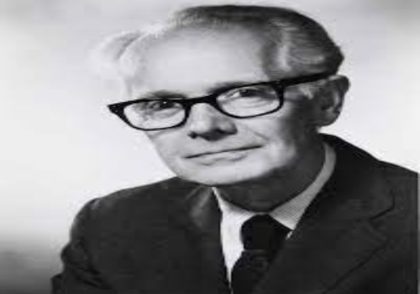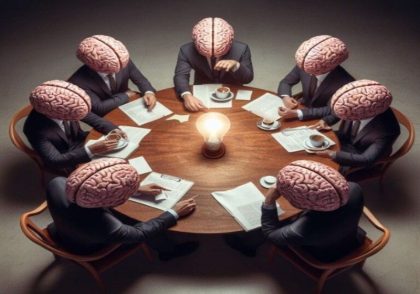Peter Fonagy

Peter Fonagy: The Psychoanalyst Who Redefined the Mind
Peter Fonagy, a leading contemporary psychoanalyst and clinical psychologist, was born in 1952 in Budapest, Hungary, during a time when Europe was still recovering from the trauma of World War II. His family emigrated to the United Kingdom during his childhood, a transition that would shape the trajectory of his personal and professional life. Fonagy studied psychology at the University of Oxford and later trained as a psychoanalyst in London. For many years, he served as head of the UCL Psychoanalysis Unit at University College London. His work has bridged classical psychoanalysis and modern evidence-based psychological science, integrating insights from developmental psychology, neuroscience, and clinical research. He is best known worldwide for his pioneering research on mentalization and the development of Mentalization-Based Treatment (MBT), particularly in the treatment of Borderline Personality Disorder (BPD).
Mentalization: Seeing the Mind Behind Behavior
Mentalization has, over the last three decades, captured the interest of an extraordinary range of specialists — from psychoanalysts and neuroscientists to child development researchers, geneticists, existential philosophers, and phenomenologists. According to data from the Web of Science, the use of the term “mentalization” in titles and abstracts of scientific papers grew from just 10 instances in 1991 to over 2,750 by 2011. This rapid expansion reflects the concept’s relevance far beyond psychoanalysis, bridging disciplines and creating a shared framework for understanding human behavior.
In its simplest form, mentalization refers to the ability to understand and interpret one’s own and others’ behavior in terms of underlying mental states — thoughts, feelings, beliefs, desires, and intentions. Fonagy expanded this definition to highlight its integration of cognitive, emotional, and interpersonal processes. Mentalizing enables individuals to regulate emotions, develop a coherent sense of self, and build healthy interpersonal relationships. Clinicians have embraced the concept as a practical therapeutic tool, leading to its central role in Mentalization-Based Treatment (MBT). Initially developed for BPD in routine clinical services, MBT has since been adapted for use with antisocial personality disorder, substance abuse, eating disorders, at-risk mothers and their infants, as well as in family therapy, adolescent treatment, school-based programs, and the management of social groups. This versatility demonstrates that mentalization is not merely a therapeutic technique, but a powerful framework for understanding and transforming human relationships.
Reflective Function (RF): The Mind’s Inner Mirror
Within the broader concept of mentalization lies the reflective function — the capacity to “think about thinking.” This meta-cognitive ability allows individuals to recognize that mental states are representations of reality, not reality itself. People with a strong reflective function can appreciate that their own and others’ mental states may differ and even be mistaken. In therapy, strengthening reflective function helps clients navigate interpersonal differences and improve emotional flexibility.
Mentalization-Based Treatment (MBT): Restoring Connection with Self and Others
In the 1990s, Peter Fonagy and Anthony Bateman developed Mentalization-Based Treatment, a psychotherapy model designed to restore and enhance the patient’s ability to mentalize. MBT integrates both group and individual therapy formats, targeting the emotional instability, impulsivity, and relational disruptions common in BPD. Research has shown that MBT reduces self-harm behaviors, improves affect regulation, and strengthens interpersonal functioning.
Attachment and Mentalization: Bowlby’s Legacy in Fonagy’s Work
Drawing inspiration from John Bowlby and Attachment Theory, Fonagy demonstrated that mentalization develops within the context of early attachment relationships. Caregivers who are attuned to and reflective about their child’s mental states foster stronger mentalizing capacities in their children. Conversely, inconsistent or insensitive caregiving can impair this capacity, increasing vulnerability to emotional and relational difficulties later in life.
Epistemic Trust: Opening the Door to Social Learning
A lesser-known but vital concept in Fonagy’s work is epistemic trust — the willingness to regard others as reliable sources of knowledge, especially in the realms of social and psychological understanding. Secure attachment fosters epistemic trust, which in turn facilitates social learning and personal development. In therapy, rebuilding epistemic trust enables patients to once again draw on their social environment for growth and change.
In the end:
Peter Fonagy’s work has reshaped the landscape of modern psychoanalysis and psychotherapy by integrating mentalization into theory, research, and clinical practice. His contributions demonstrate that enhancing mentalizing capacity can repair disrupted connections between individuals and their social worlds. Concepts such as mentalization, reflective function, MBT, attachment, and epistemic trust have become essential tools for psychotherapists, counselors, and researchers in mental health.
References
Bateman, A., & Fonagy, P. (2016). Mentalization-Based Treatment for Personality Disorders: A Practical Guide. Oxford University Press.
Fonagy, P., Gergely, G., Jurist, E. L., & Target, M. (2002). Affect Regulation, Mentalization, and the Development of the Self. New York: Other Press.
Fonagy, P., & Allison, E. (2014). The role of mentalizing and epistemic trust in the therapeutic relationship. Psychotherapy, 51(3), 372–380







Leave a Reply